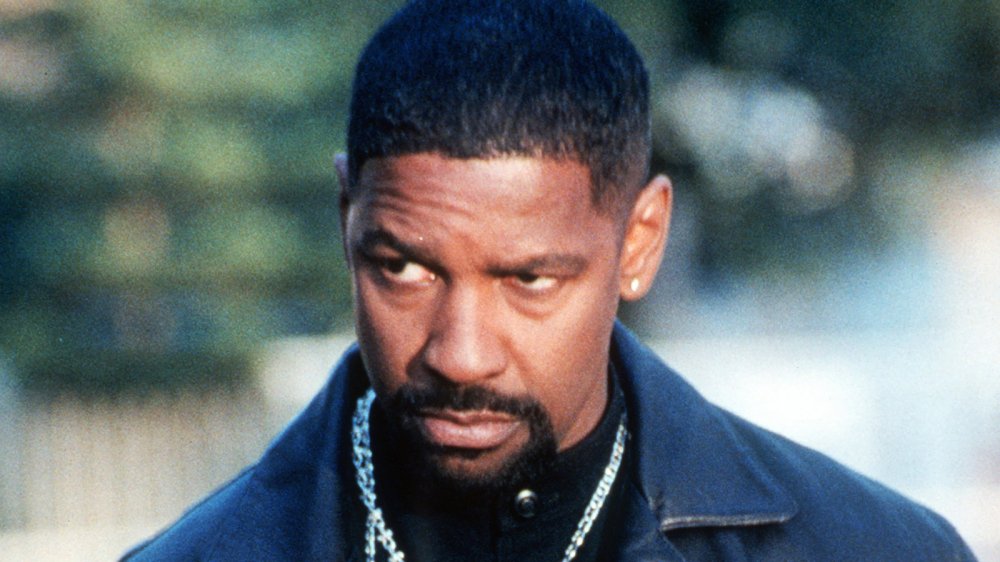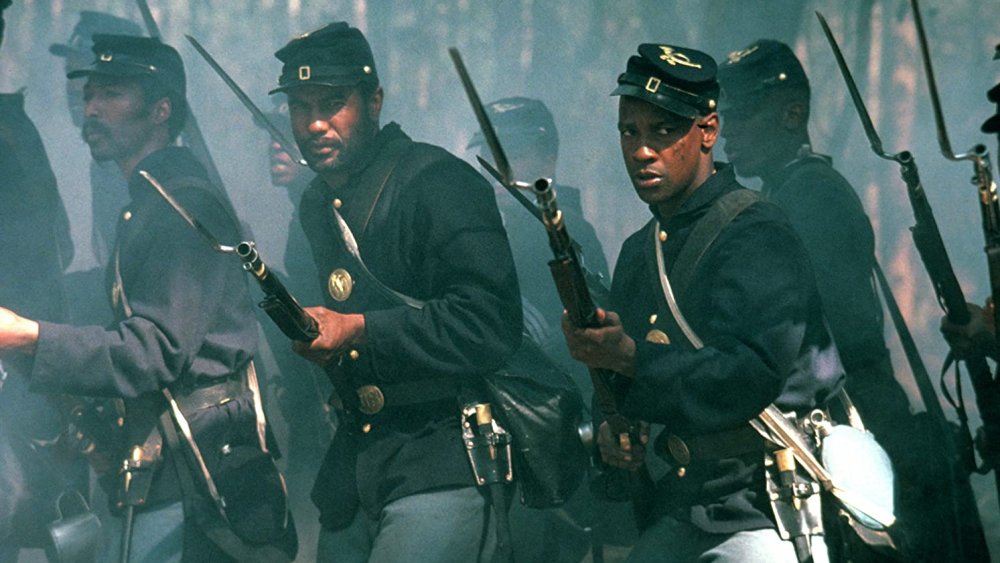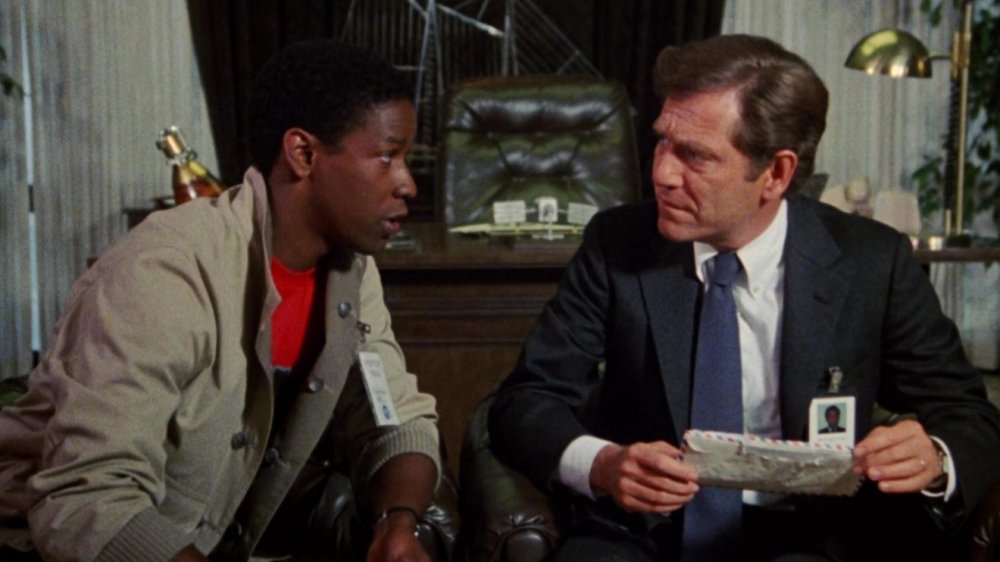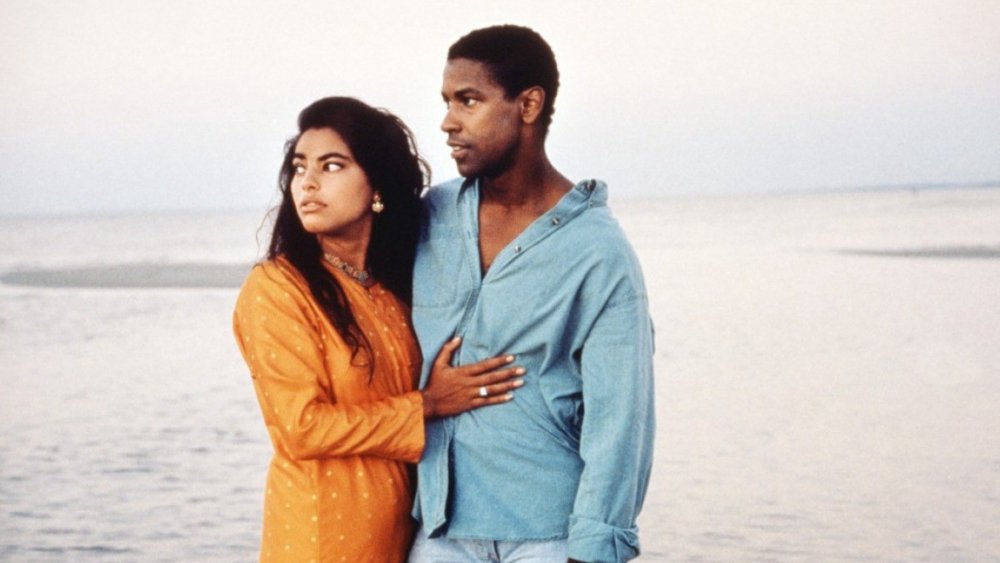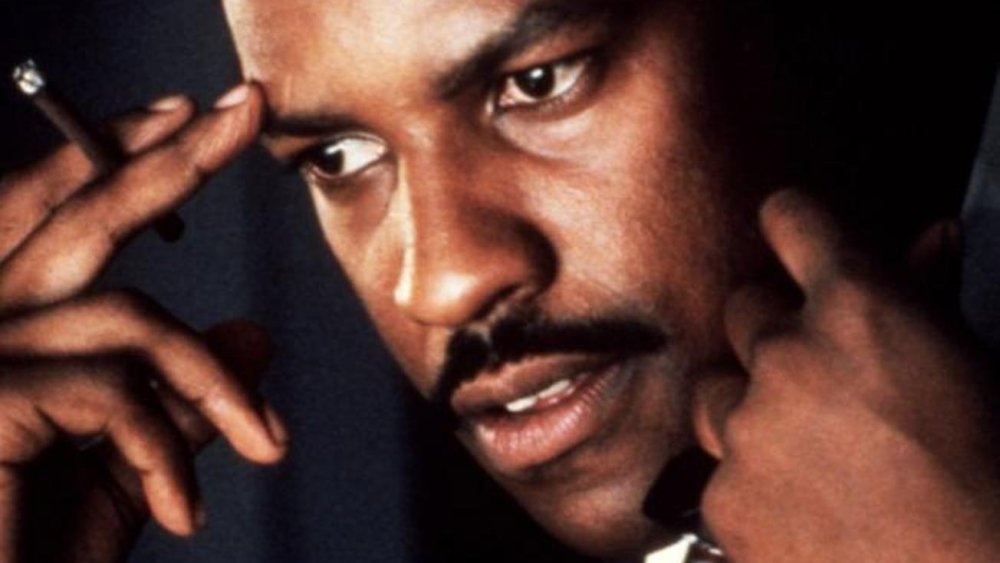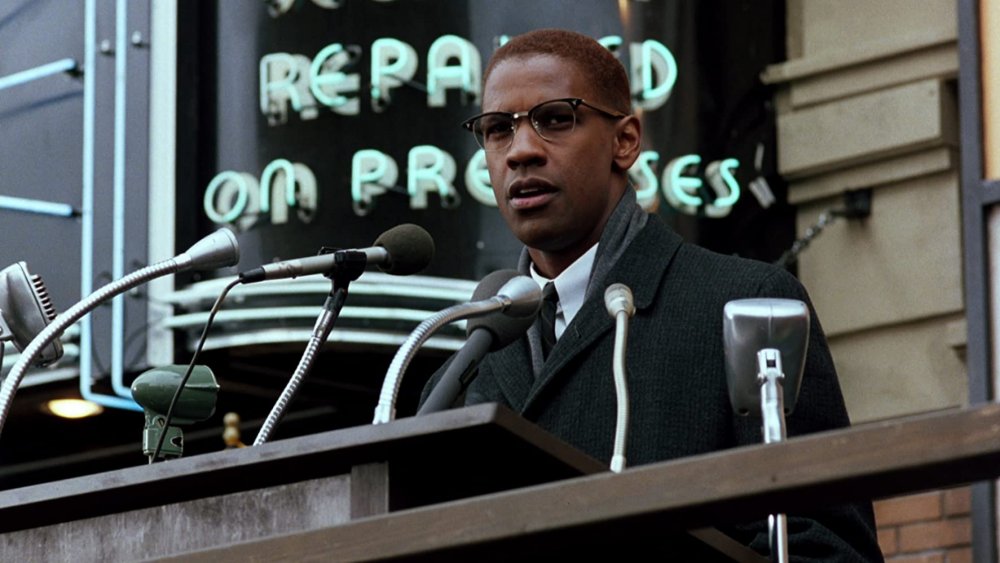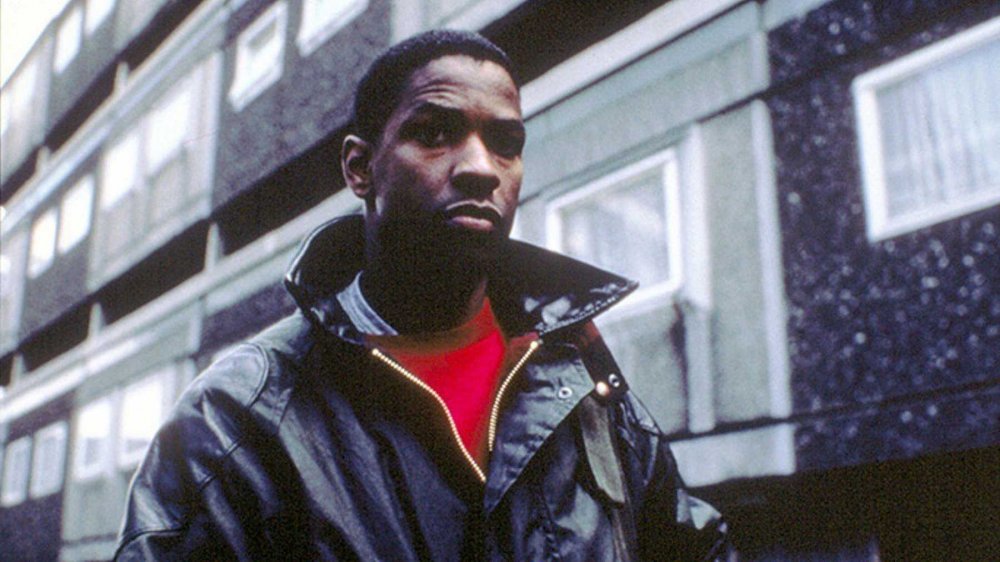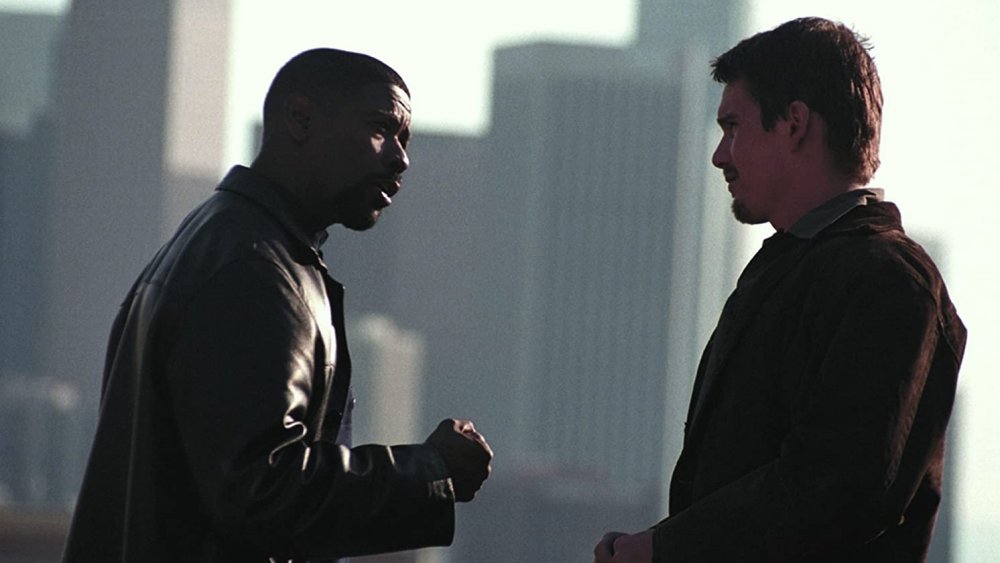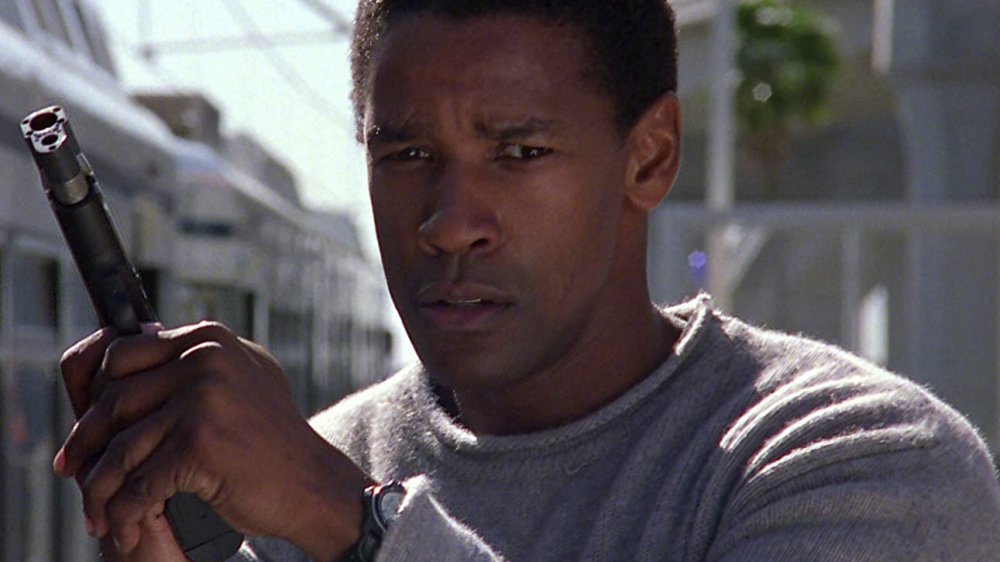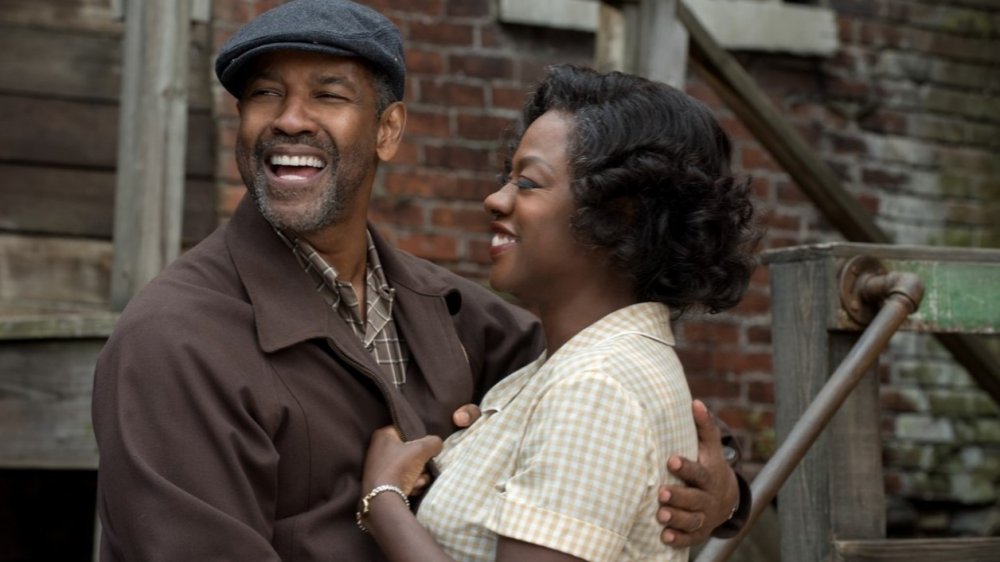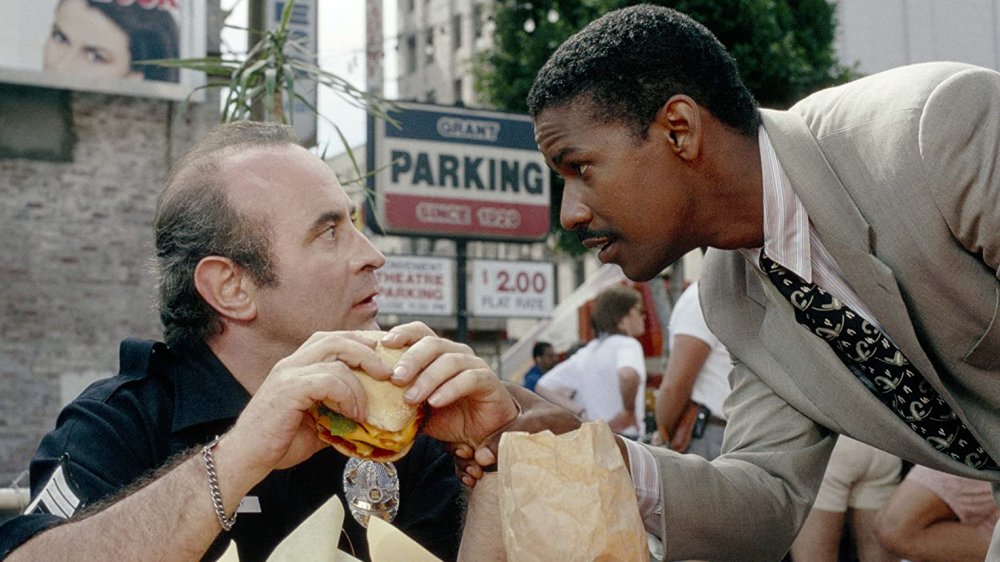Best And Worst Denzel Washington Movies
Denzel Washington's confidence, poise, and undeniable onscreen charisma have made him a magnetic leading man that audiences have been lining up to watch for decades — one of Hollywood's most instantly recognizable actors, producers, and directors, he's earned two Academy Awards, a Tony Award, and two Golden Globes, as well as the prestigious Cecil B. DeMille Award for his "outstanding contributions to the world of entertainment."
"Life has taught me to just try and be the best that I can be," he's said — and he continues to challenge audiences and himself, whether navigating a post-apocalyptic wasteland (The Book of Eli), investigating a political conspiracy (The Manchurian Candidate), beating down the Russian mafia while timing himself on his wristwatch (The Equalizer), or plotting to seize the throne of Scotland in The Tragedy of Macbeth. Of course, nobody's perfect, and Denzel Washington is no exception: His long filmography includes some embarrassing failures as well as award-winning achievements. With all that in mind, here's a look back at some of Washington's best and worst films.
Best: Glory
Denzel Washington had been acting in film and television for about a decade when he appeared in Edward Zwick's 1989 drama Glory, about the all-black 54th Regiment of the Massachusetts Volunteer Infantry during the Civil War. Matthew Broderick plays Col. Robert Shaw, the son of an abolitionist who leads the troops. Although they receive demeaning tasks and racist pushback while fighting for the Union and against slavery, they prove their valor against all expectations in the bloody July 1863 assault on Fort Wagner.
As Trip, an escaped slave, Washington won an Oscar for Best Supporting Actor and serves as the film's heart, enriching a film that his oldest son, actor John David Washington, lists among his favorites. In addition to Washington and Broderick, Glory boasts a stellar cast that includes Cary Elwes (The Princess Bride), Morgan Freeman (The Shawshank Redemption) and Andre Braugher (TV's Homicide: Life on the Street, Brooklyn Nine-Nine). Even among all that talent, critics highlighted Washington as someone to watch, with the New York Times calling him "an actor clearly on his way to a major screen career."
Worst: Carbon Copy
Denzel Washington is such a consistent powerhouse that even films that leave critics lukewarm, such as 2004's Man on Fire or 1997's Fallen, tend to receive favorable audience scores on Rotten Tomatoes. He has a few misses, however, particularly early in his career — including his theatrical debut, which unfortunately arrived in the 1981 comedy Carbon Copy.
A clumsy attempt to satirically send up racial stereotypes, the film stars George Segal (TV's Just Shoot Me!) as a corporate executive who discovers he has an illegitimate black son (Washington) after losing his job, his house, and his Rolls Royce. "Any resemblance between father and son is purely hysterical," the film's tagline said. While the New York Times admitted the film isn't "the uneasy mélange of racial stereotypes that it might have been," Washington can't quite pull off a character who's supposed to be sympathetic and exploitive at the same time.
Best: Mississippi Masala
Throughout extensive filmography, Denzel Washington hasn't often played a romantic lead, but this under-appreciated arthouse hit from director Mira Nair (Monsoon Wedding) underscores his sex appeal. Washington plays Demetrius, the proprietor of a Mississippi carpet-cleaning business, who initially asks Meena (Sarita Choudhury, The Perez Family), an Indian woman whose family runs a motel, out on a date in order to make an old flame jealous. But isn't long before the two fall deeply and radiantly in love. Nair blends a variety of thematic ingredients into this rich visual stew; the couple faces prejudice from their families, and Meena's family also deals with heartache over leaving India. But overall, as the Washington Post argued, it's a "seductively funny film" with two sweethearts who know how to "turn up the flames." Just check out Demetrius's bemused reaction when Meena says she's masala, or of mixed background. "Hot and spicy," he says with a grin, touching her shoulder with a hiss as if she sizzles before they both burst out laughing.
Worst: Power
Director Sidney Lumet has many acclaimed films — including Serpico, Network, and Before the Devil Knows You're Dead — to his credit, and the social dramas he tackles frequently provide actors with meaty roles for their resumes. Unfortunately for Washington, Lumet's Power, a 1986 drama about politics and the media, proved a tepid exception. On paper, it looks great: In addition to Washington, the picture's cast includes Richard Gere, Julie Christie, and Gene Hackman. It's far less than the sum of its parts, however.
Gere plays a media consultant who comes across a conspiracy involving a DC public relations expert (Washington) and an Arab sheik trying to oust a U.S. Senator. While the script has some of the bite of classic film noir, the plot loses its way to the point that, as critic Roger Ebert wrote, "The movie itself seems to sense that it's going nowhere." Washington has since proven he can make a strong impression with little screen time, but he's not given much to work with here.
Best: Malcolm X
Denzel Washington's creative partnership with director Spike Lee began with 1990's Mo' Better Blues, but this 1992 biopic of slain civil rights leader Malcolm X proved a tremendous step forward. Washington had already appeared in a play about Malcolm X about a decade before signing on for this film, which he told NPR inspired him to "dig deep and listen to all the speeches and read his books and study the man." The immersion paid off: Critics called the film an "intimate and engrossing" triumph and a "galvanizing political tragedy," one that proves consistently riveting in spite of a running time of 3 hours and 21 minutes.
Washington earned an Oscar nomination for his work in the title role, playing a man who inspired millions as a fierce spokesman for Black pride and self-determination. As Newsweek notes, his "impeccably controlled performance" fuses the film's disparate elements with the actor's signature conviction and grace.
Worst: For Queen and Country
Denzel Washington isn't afraid to try different genres or step out of his comfort zone, a testament to his versatility as an actor. While he built his career on dramatic performances such as his portrayal of South African activist Steve Biko in 1987's Cry Freedom, he's also veered into comedy with 1993's Much Ado About Nothing and mystery with 1995's Devil in a Blue Dress. This 1989 directorial debut from writer-director Martin Stellman (The Interpreter) was a less successful experiment, a social drama involving racism and disillusionment, topics that Washington has explored throughout his career. Washington was up for the challenge of portraying a British paratrooper who clashes both with white cops and Black peers after his time in the military, but the result was a mixed bag. "He isn't bad in the part, but his accent strays absurdly," wrote Time Out, which also dinged the film for its "often corny plotting" and "preposterous shootout ending."
Best: Training Day
In the first of several collaborations with director Antoine Fuqua, Washington embraced an "electrifying" departure into the dark side, playing against type after being consistently cast in heroic or sympathetic roles. A brutal police thriller, Training Day sees Washington playing corrupt narcotics detective Alonzo Harris, who's supposed to evaluate a potential new squad member (Ethan Hawke) but seems more interested in running his own schemes, including how much he can rattle the younger man before shoving him into the abyss.
"What's so perturbing about Washington's work here is that there's nothing chameleon-like about it. He's his usual direct, charming, handsome self, except that he also has a sadistic streak that, as it gradually surfaces, turns him from a mean tease into a complete monster," wrote the Village Voice. The role netted Washington an Oscar for Best Actor, the second time a Black actor had won the award overall and first since Sidney Poitier's win for 1963's Lilies of the Field. "I'll always be chasing you, Sidney. I'll always be following in your footsteps," Washington said in his acceptance speech. "There's nothing I would rather do, sir. Nothing I would rather do."
Worst: Virtuosity
Years before both of them earned acclaim in the 2007 biographical crime drama American Gangster, Denzel Washington and Russell Crowe appeared together in the 1995 sci-fi clunker Virtuosity. Washington plays a disgraced Los Angeles cop who is reinstated to track down Sid 6.7 (Crowe), a virtual reality entity that runs amok in the real world after he's programmed with the character traits of mass murderers such as John Wayne Gacy and Charles Manson. (This was supposed to be a police training program, but honestly, in what reality would a person think this is a bright idea?)
Director Brett Leonard, who also helmed 1992's The Lawnmower Man, apparently was fascinated with this then-new technology, but the concept didn't make for a satisfactory film. The San Francisco Chronicle tossed some praise Washington's way, saying his presence "lends the picture a much-needed dose of authenticity," but overall, the film was all flash — a lot of noise and light with little nuance.
Best: Fences
Denzel Washington enjoys acting onstage as well as onscreen, appearing in theater productions such as Julius Caesar, Richard III, and A Raisin in the Sun. He and Viola Davis won Tony Awards for their performances in the 2010 revival of August Wilson's 1985 Pulitzer Prize-winning play Fences, and the two reunited for this 2016 film adaptation that Washington directed, his third feature behind the camera after 2002's Antwone Fisher and 2007's The Great Debaters.
Washington gives a "titanic" performance as larger-than-life but flawed Pittsburgh garbage collector Troy Maxson, a star ballplayer in the Negro Leagues in his youth who never broke through the color barrier. That disappointment, among others, curdles into bitterness that he directs at his wife (Davis), sons, and time itself. The American Film Institute named Fences one of the ten best films of 2016, and the film gave Davis her first Oscar win for Best Supporting Actress.
Worst: Heart Condition
One of the few directing credits for producer and writer James D. Parriott (TV's Grey's Anatomy), this "terminally contrived" supernatural comedy has the dubious distinction of holding a rating of 0% on Rotten Tomatoes. Bob Hoskins (Who Framed Roger Rabbit, Snow White and the Huntsman) plays a racist detective who can't stand that his girlfriend (Chloe Webb, Sid and Nancy, TV's Shameless) has left him for a dashing black lawyer (Denzel Washington). Then the cop has a heart attack, the lawyer dies in a car wreck, and the cop receives the lawyer's heart through an organ transplant. As a bonus, the lawyer's ghost follows the cop around to offer nutritional and life advice. Washington manages to give his comedic lines "a winning suavity," but it isn't enough to bridge the gap between the film's serious themes and ill-advised attempt to mine humor from the racial divide. It's enough to give viewers who like these talented performers agita.
